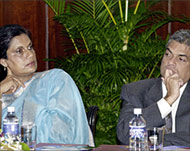Peace as elusive as ever
An unprecedented move by Sri Lanka’s president to suspend parliament and sack key ministers is the latest salvo in a battle between two different visions of the island’s future.

It is also part of a personal feud between President Chandrika Kumaratunga and her arch rival, Prime Minister Ranil Wickremesinghe.
The president believes Wickremesighe’s government has made too many concessions in recent negotiations with the rebel Tamil Tigers.
She says an imminent peace deal with the Tigers will pave the way for a separate state in the island’s north.
On the other hand, Wickremesinghe says Sri Lanka’s brutal civil war has been fuelled by politicians with vested interests.
He argues that a limited degree of autonomy for the Tamil minority is the only way out of a brutal civil war that has cost more than 60,000 lives.
The winner of this political power struggle could herald a new dawn of hope for the country, or hasten its slide back into civil war.
Brutal war
In the early 1980s, many experts predicted Sri Lanka would become Asia’s number one success story.
They argued that its plentiful natural resources, educated workforce, and enormous tourist potential would make it the new Singapore.
But since then more than 60,000 people have been killed in a conflict which began when Tamil Tigers took up arms 20 years ago.
The Tamils said they were being discriminated against by the majority Sinhalese, and fought for a separate state in the country’s north and east.
When President Kumaratunga announced in December 1999 that she had invited Norway to broker a peace deal, Sri Lanka’s government came out of the international dog house.
Prime minister Ranil Wickremesinghe cemented his ties with the international community by meeting President George Bush in Washington last year.
Violence
Despite years of trying the Sri Lankan army is no closer to defeating the Tigers militarily, and there is a tacit recognition that peace will only be possible at the negotiating table.
On Saturday 1 November, the Tamils offered the government a fresh set of peace proposals, ending their boycott of peace talks.
 |
|
President (L) and PM (R) come |
They called for an interim self-government authority in the north which would raise taxes, maintain law and order, and control trade.
The Tamils also proposed the interim authority would function until a permanent peace deal is reached, or for a maximum of five years.
However, Kumaratunga responded unequivocally to the proposals by her actions on Tuesday.
For some time she has been a vociferous opponent of the way the peace initiatives with the rebels have been conducted.
In May 2003, she indicated she would be prepared to sack Wickramasinghe’s government if she felt it was making too many concessions.
The president has also expressed displeasure with the Norwegians – who brokered the February 2002 ceasefire – and are now the peace monitors.
Few governments, she said, would tolerate a foreign delegation advising them to “write away their sovereignty”.
Defiance
However, Prime Minister Wickramesinghe responded to Kumaratunga’s move in defiant fashion.
Speaking in Washington, he said she “has precipitated a national crisis in an attempt to subvert the mandate given to my government by the people”.
“Your government will not be deviated from the mandate given it by the people – to pursue the path of peace, security and economic prosperity – due to the irresponsible and precipitous actions of the president aimed at plunging the country into chaos and anarchy,” he said.
Since Wickremesinghe took office in 2001 Sri Lanka has enjoyed relative peace.
The Tigers have already renounced their demand for a separate state, probably out of fear of being dragged into the international “war on terror”.
But even before the attacks of September 11, Wickremesinghe had built brdges to the rebels by insisting that a political answer – not war – was his goal.
More importantly, Wickremesinghe declared what none of his predecessors dared to admit – that Sri Lanka’s political mess was down to politicians who had wrecked the country.
Born to rule
Nevertheless, many analysts speculate that it is Wickremesinghe’s deep personal rivalry with Kumaratunga that is on the verge of wrecking the latest peace hopes.
 |
|
The president controls Sri Lanka’s |
Both politicians come from proud, political dynasties that, some say, believe they were born to rule.
For example, both of Kumaratunga’s parents were prime ministers of Sri Lanka.
At the time of her election she said that politics was in her blood, even though her father had been assassinated, and her husband was gunned down in 1989.
Kumaratunga was herself almost killed in an attack by a suspected Tamil Tiger suicide bomber during presidential elections in 2000.
But in December 2001, she suffered a setback when her longtime political opponent Ranil Wickramasinghe took office as Sri Lanka‘s new prime minister.
Her governing People’s Alliance (PA) lost to the opposition United National Party (UNP) and is now itself in opposition.
Wickremesinghe, 54, also believes he was born for politics.
One of his ancestors was a 17th century king and when he was first elected to parliament at the age of 28, the country’s then prime minister was his uncle.
Since coming to power his differences with the president have only worsened.
Entrenched differences
Chandrika Kamratunga and Ranil Wickremesinghe are without doubt two of Sri Lanka’s most able politicians.
Both represent significant differences of opinion among Sri Lanka’s Sinhalese community about how to deal with a powerful, armed minority in its own backyard.
These differences have bedevilled Sri Lankan politics for more than two decades.
And, as often before, when the solution appeared to be within spitting distance it has proved to be far, far away.